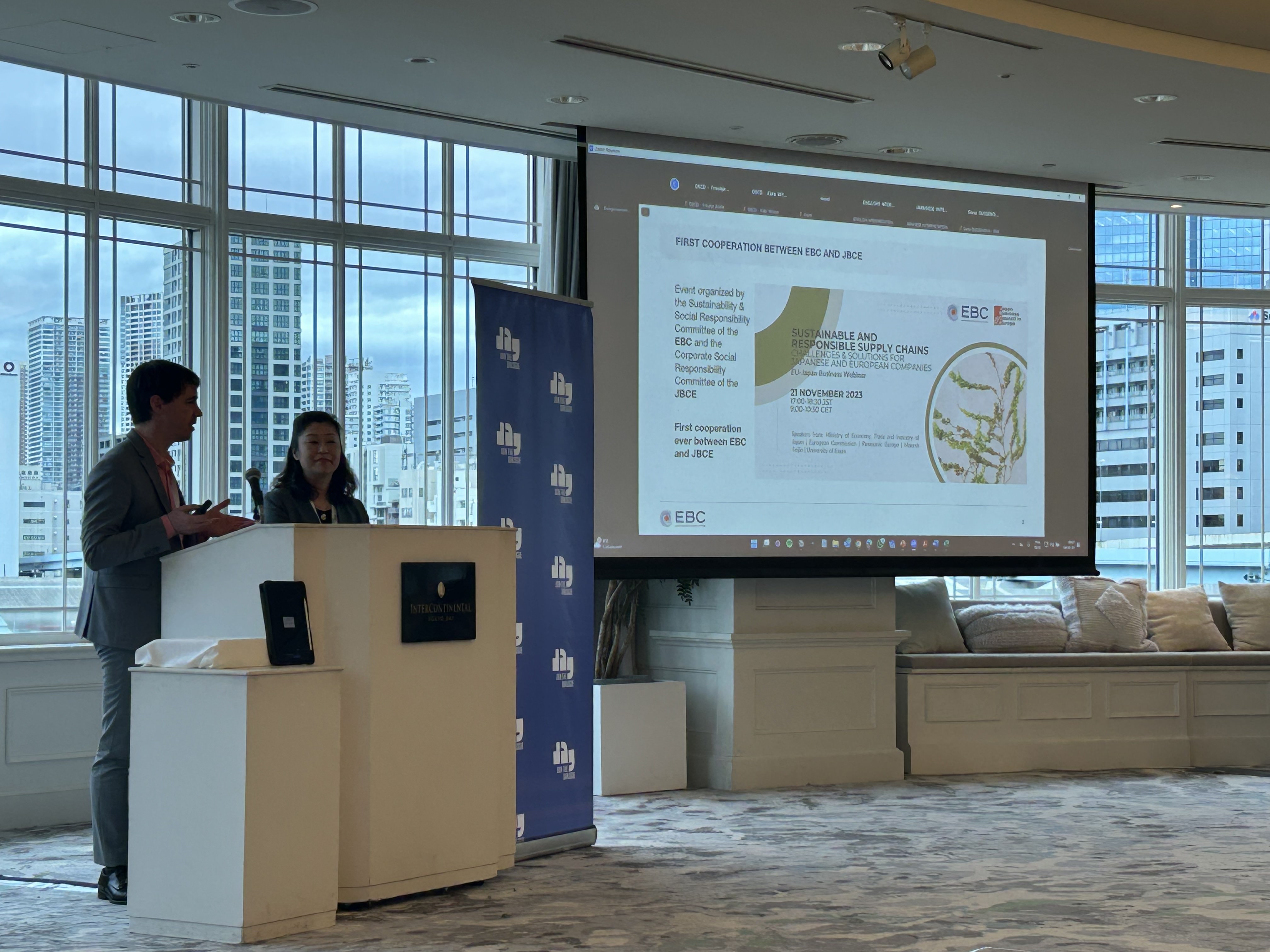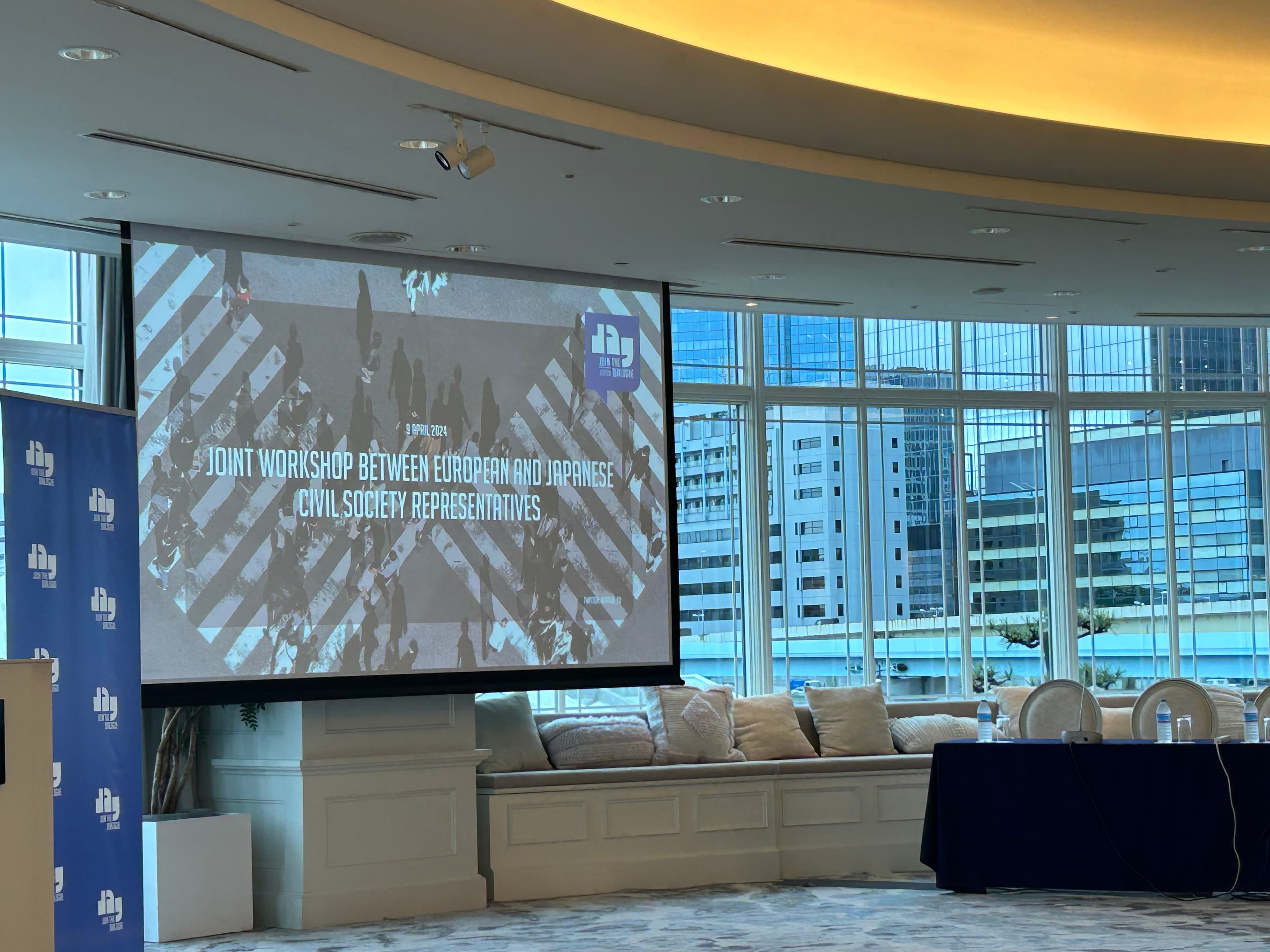On April 9th 2024, the European Business Council facilitated a pivotal workshop titled “Promoting Human Rights and Environmental Due Diligence Together.” Aimed at bridging the gap between the civil societies of the EU and Japan, the session centered around the exchange of best practices and the pursuit of solution-oriented strategies. The workshop underscored the mutual commitment of the EU and Japan to uphold human rights and environmental standards, reflecting their shared values and the imperative to maintain resilient and sustainable business operations. Key highlights included an exploration of the latest updates to the “OECD Guideline for Multinational Enterprises on Responsible Business Conducts” (RBC), with a special focus on new initiatives in Asia. The dialogue reiterated the critical need for enhanced collaboration at both the political and enterprise levels between the EU and Japan to further these goals. This article delves into why joint efforts between the EU and Japan are important.
Latest Updates to the OECD Guidelines for Multinational Enterprises on RBC
Presented by Ms Froukje BOELE, Head of Public Policy, OECD Center for Responsible Business Conduct (RBC): The latest revision to the "OECD Guideline for Multinational Enterprises on RBC introduces several significant updates aimed at strengthening global business practices concerning environmental and ethical standards. Key among these is the establishment of the first internationally agreed standard for business approaches to climate change and biodiversity conservation, marking a pivotal step in corporate environmental accountability. Furthermore, the guidelines now require companies to perform risk-based assessments on the potential and actual adverse impacts of their operation not just within their own activities but through their supply chain and operation. Another major enhancement includes expanded due diligence processes that now cover the complete lifecycle of products and services, ensuring companies maintain responsibility from production to post-consumer stages. These updates represent a proactive move towards more sustainable and responsible global trade practices.
New OECD Project: "RBC for Green, Digital, and Responsible Supply Chains in Asia"
Presented by Ms Kate WILSON, Project Manager, Asia, OECD Center for RBC: Launched in December 2023, the OECD's ambitious four-year project "RBC for Green, Digital, and Responsible Supply Chain in Asia," supported by the European Union, aims to set a new standard in responsible business conduct across Southeast Asia. Engaging with high-income regional partners including Australia, Japan, Korea, New Zealand, and Singapore. The project covers critical areas such as digital responsibility, sustainable finance, environmental due diligence, and the integration of responsible conduct into trade and investment practices. Over the next 3.5 years, the project will unfold through a series of capacity-building efforts, including the launch of new e-learning modules under the OECD Responsible Business Conduct Academy, and the translation of key business tools into multiple Asian languages. Additionally, tailored workshops and comprehensive analyses will explore the interplay between business practices and responsible conduct in diverse sectors such as electronics and finance. The initiative also plans extensive community engagement and collaborative government efforts to enhance awareness and implementation of responsible business practices throughout the region. This comprehensive approach underscores a significant move towards embedding sustainable and ethical methods within the fabric of Asian business landscapes.
Challenges Encountered by Japanese and European Firms in Asian Supply Chains
Presented by Mr. Stefan LE DU from European Business Council, and Ms Yukako Kinoshita from Japan Business Europe Council: Addressing the importance of responsible business practices, many challenges faced by Japanese and European firms operating within common Asian supply chains were highlighted. The intertwined interests and operations in these regions greatly complicate oversight and management, necessitating an effective approach to handle the diversity of local regulations encountered across different countries. These varying local statutes add complexity to achieving compliance and maintaining consistent standards throughout the supply chains. Moreover, the experts pointed out significant differences in regulatory approaches; while the EU enforces a stringent regulatory framework with strong environmental obligations, Japan prefers a guideline-based, less rigid system focused mainly on human rights. This leads to a divergence in compliance requirements for businesses active in both markets. The situation is further complicated by cross-jurisdictional impacts, where European and Japanese regulations influence each other, complicating the regulatory landscape for multinational corporations. Both speakers stressed the need for a collaborative and holistic strategy that involves all stakeholders to effectively navigate these challenges and promote sustainable and responsible business practices globally.
The Way Forward: Promoting RBC in Japan through Collaboration
The introduction of comprehensive guidelines for responsible corporate behavior, encompassing human rights and environmental sustainability, has the potential to transform Japanese businesses. As Japan navigates the challenges of adopting these guideline, such as cultural differences and traditional business practices, collaboration between the EU and Japan becomes crucial in sharing knowledge, resources and best practices. Japan's endeavor to conform more closely with EU standards hinges on robust collaboration among the government, industry, and market leaders. Incentives such as tax breaks, grants, and public recognition can motivate companies to engage in sustainable practices. Additionally, a firm commitment from leading Japanese firms to prioritize human rights and environmental protection is vital. By embracing RBC, Japanese businesses stand to benefit from improved reputation, increased competitiveness in global markets, and long-term sustainability. Looking ahead, it will be important to identify the entities responsible for educating, overseeing, and steering the efforts of businesses, including small and medium-sized enterprises, towards these goals.

Resources
OECD Guidelines for Multinational Enterprises on Responsible Business Conduct
OECD: CASE STUDIES ON ENVIRONMENTAL DUE DILIGENCE:EXAMPLES FROM JAPANESE BUSINESSES





